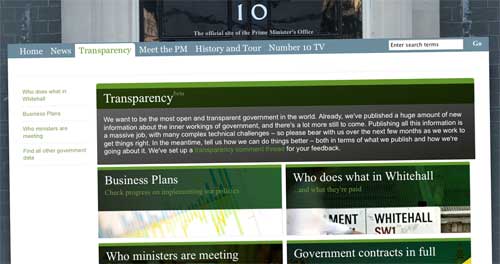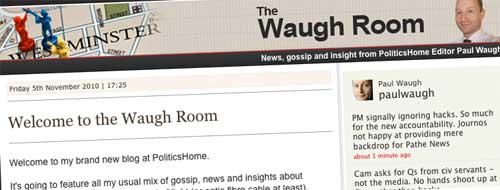In the world of the government webby, it really doesn’t come a lot juicier than this. Jayne Nickalls’s resignation as chief executive of Directgov was confirmed via Twitter on Saturday:
[blackbirdpie url=”http://twitter.com/#!/jnickalls/status/5971161754107904″]
This was followed by a report in the Sunday Express (which I’d have missed, were it not for a helpful tipoff):
THE boss of a major Government website has quit amid concerns about a “politicised power-grab” by David Cameron’s spin doctors. Jayne Nickalls, the chief executive of Directgov … left last week. The organisation’s board has also been dissolved before an announcement about the website’s future due on Tuesday.
I’d heard rumours about the board’s dissolution: so I contacted Rory Sutherland, a man who knows a thing or two about public relations, who was appointed as a non-exec director in 2008.
[blackbirdpie url=”http://twitter.com/#!/simond/status/5961035764736000″]
[blackbirdpie url=”http://twitter.com/#!/rorysutherland/status/6347334073978880″]
Beautifully worded.
Directgov itself has virtually no information about its own board. So I’ll have to quote a COI press release from 2008, which says the board existed for the following purposes:
- Contributing to and approving an annual business plan to meet the requirements of the annual remit letter;
- Agreeing strategies for the delivery of the business plan, priorities for delivery and the allocation of resources;
- Setting the standards and values of the organisation;
- Agreeing annual KPIs for Directgov and regularly monitoring performance against them; and
- Ensuring achievement of Directgov’s targets associated with the cross-Departmental Service Transformation Delivery Agreement.
Now… you could certainly put two and two together here, with the proposal that all government (ie policy / political) material should be merged with Directgov’s rather clinical information, and the protective layer of the board being removed, to conclude that Jayne had walked out as a direct consequence.
I stress, I don’t know if this is or isn’t the case: but you’d certainly understand if she felt this would jeopardise, and potentially compromise the ‘public services’ brand she’d worked hard to develop over the last five years. And stripping away the board, quite abruptly from what I’m hearing, can only have heightened any concerns she might have had.
Have a good week, gang.
PS I’ll also note in passing the piece in the Observer today: ‘Britons will be forced to apply online for government services such as student loans, driving licences, passports and benefits under cost-cutting plans to be unveiled this week… Cabinet Office officials say the full savings will only be felt if everything is moved online. Leaving even a small percentage of print registrations would be “prohibitively expensive”.’ Although there isn’t even a namecheck for Directgov itself, it’s an illustration of just how central it is to the government’s overall cost-cutting drive.

